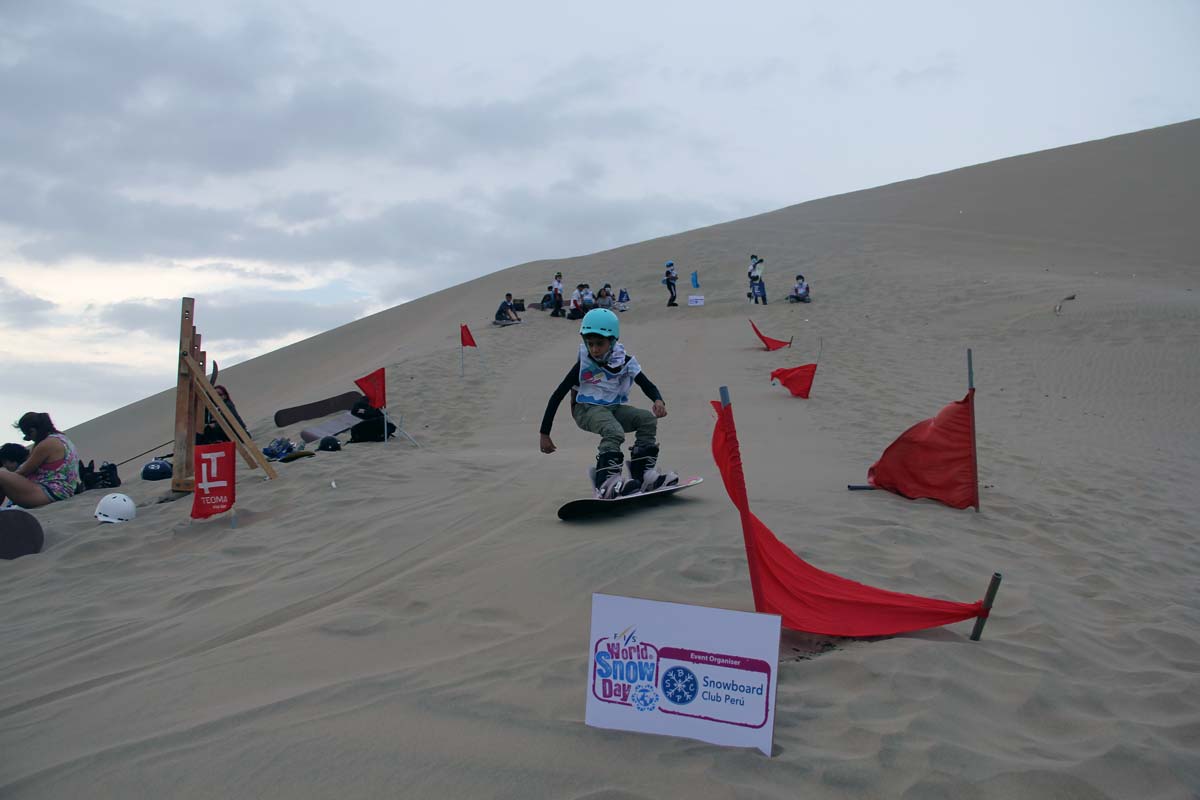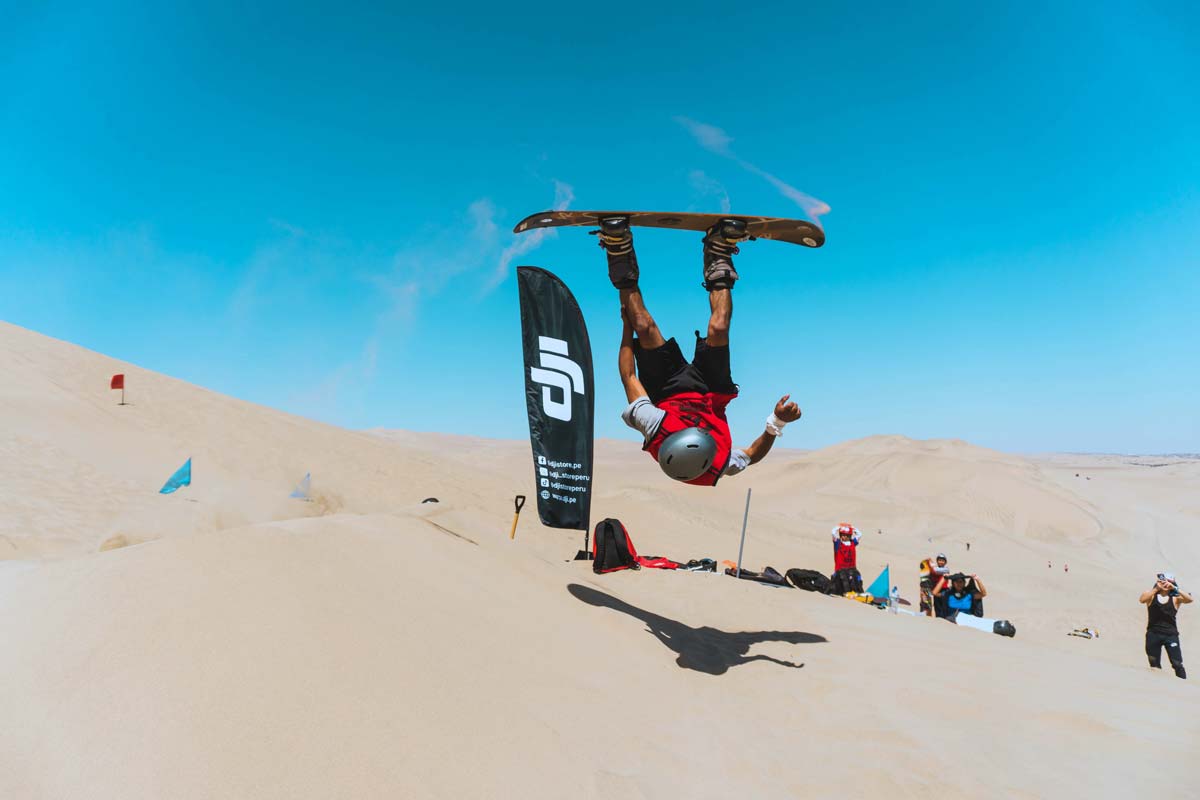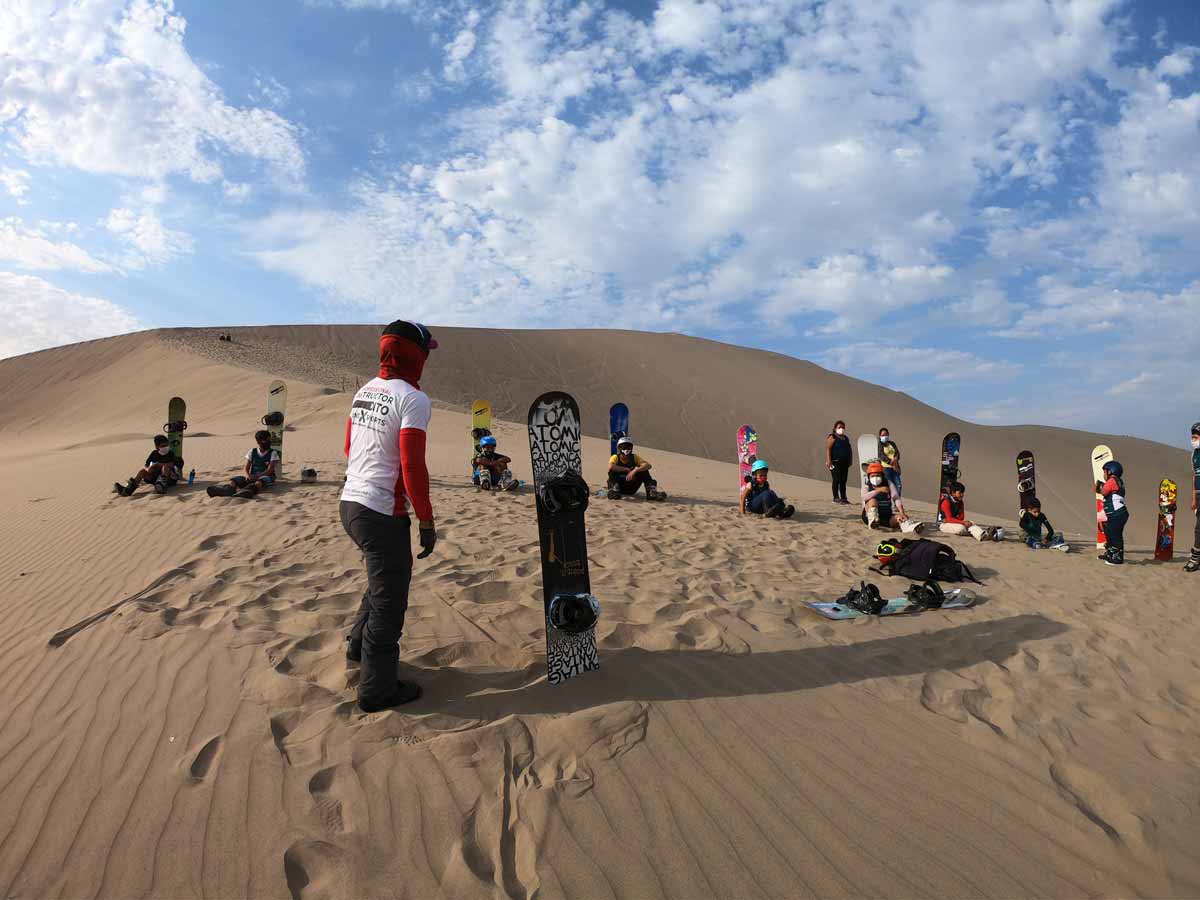
The Snowboard Club Peru, chaired by Alejandro Veliz, a graduate of the Official Master’s Degree in Sport Management, and co-founded with snowboarder Victor ‘Dito’ Chavez, is the cradle of sandboarding in Peru: sand dunes as an introduction to snowboarding for entertainment or high competition and the scene of a wonderful social project for young people at risk of exclusion called Sueños de Arena (Dreams of Sand)
In the coastal desert of Peru, four hours south of Lima, lies one of the most marvelous natural sites in the South American country. The Huacachina oasis, known for its sulfurous green waters and abundant groves of palm, eucalyptus and carob trees, lies at the foot of miles and miles of sand dunes. Its improvised reliefs make it the perfect place to practice sandboarding in Peru. Huacachina is a place where dreams come true.
This is the headquarters of the Snowboard Club Peru, an organization dedicated to developing and professionalizing the sport of as an alternative activity for introduction to snowboarding, improving training and technical conditions, and increasing Peru’s competitiveness in winter sports. An ambitious objective that has the support of the Peruvian Olympic Committee and bears the stamp of one of its most illustrious athletes: Victor ‘Dito’ Chavez, quadruple world sandboard champion and the first Peruvian in history to qualify for a Snowboard World Cup. All this without turning its back on the reality of the inhabitants of the desert, generally families with few economic resources and social difficulties. Sueños de Arena (Dreams of Sand) is a solidarity project conceived by the Snowboard Club Peru aimed at educating and offering development paths to children and young people between 6 and 17 years of age at risk of exclusion, empowering and improving their quality of life through sport.

Nice family photo of some members of the Snowboard Club Peru, in the dunes of Huacachina.
The club was founded in 2019 on the initiative of Alejandro Veliz, a graduate of the Official Master’s Degree in Sport Management from Johan Cruyff Institute, and Victor ‘Dito’ Chavez himself, with the aim of bringing the sport of snowboarding to the inhabitants of Peru, nestled in the Andes Mountains, but without ski resorts to practice the sport. And, through much effort on the long journey that lies ahead, it also aims to replicate the talent of ‘Dito’ and make Peru more competitive internationally in the discipline of snowboarding.
“In Peru we have very high mountains, but no ski resorts: our aim is to promote sandboarding as an introduction to snowboarding and to increase the competitiveness of Peruvians in the snow”
Victor Chavez is now the coach that he himself did not have when, at the age of seven, he started sliding down the dunes of Ica and promised himself that one day he would represent Peru in the Winter Olympics. The Sueños de Arena program takes him back to his childhood, but the route is different and he is no longer doing it alone. As an instructor of the project he brings, together with his team, the best values of sport to children and young people of the region: respect, companionship, honesty, perseverance, self-effort and teamwork. The Snowboard Club Peru is part of their development as individuals, identifies those with motivation and talent and provides the means if they decide to direct their future towards competitive sport.
Its president, Alejandro Veliz, takes us in this interview to the roots of the club, tells us about the challenges involved in developing a sports discipline from scratch and the resources that the Official Master’s Degree in Sport Management gave him to shape this incredible sport project.
How was your dream of sand born?
My passion for snowboarding dates back to 2010, during a stay in Colorado (USA). I fell in love with this sport and when I returned to live in Peru I always felt that something was missing. In Peru we have very high mountains, but there are no ski resorts. So, I started looking around and saw that they were organizing a snowboarding event in the city of Huaraz, at 4,500 meters above sea level. There I met a group of guys who practiced sandboarding, the closest thing to snowboarding, but in the dunes. It was an interesting alternative that allowed me to replicate the sensations I had in the snow. As I got more and more into sandboarding, I discovered that there was a way to move from the sand to the snow and I got to know the story of an athlete who started on the dunes 10 years ago and is now competing in European snowboarding championships. He was Victor ‘Dito’ Chavez.
How did you meet?
After that first experience in Huaraz, in the snowboard event, I went to Huacachina, in the desert of Ica, where they were holding a sandboarding promotion championship and one of the judges was Dito. Talking with him, I perceived that he had a very professional attitude, that of an elite athlete, and I told myself that it was time to help him in what he was doing and try to replicate everything he had achieved. He with his experience as an athlete and me more on the management side.
And you agreed to start working together?
Yes, we have worked, lived and traveled together. It is a very genuine relationship and passion for the sport. That was creating a natural partnership to create the club, to start organizing championships, to work on our social project Sueños de Arena so that boys and girls in complicated situations can take up our sport for free. And our most important objective as a club is to be able to constitute a federation to provide our sport with greater institutionalism in the country. The Peruvian Olympic Committee assumes the role of federation in relation to the International Ski Federation; however, not having its own federation severely limits growth.

The Snowboard Club Peru organises events to develop and spread the discipline of sandboarding in Peru as a stepping stone to snowboarding.
Tell me about the Snowboard Club Peru, how is it structured and what activities do you organize?
The club is located in one of the most beautiful natural spots in Peru, in Ica, the region that is home to the Huacachina desert. That is where we have our base of operations because it is the most affordable place with the biggest variety of dunes to practice sandboarding. It is a privileged place. We have a great variety of boots and boards that are the same as snowboards, but adapted to the sand to slide well. We also offer seasonal snow tours as a formula for self-financing the club and we have an important ski team, with which we go on trips to San Martin de los Andes (Argentina) and Isola 2000, in the south of France. The alliances we have with the Snowboard Team Chapelco and the Back to Back Club allow our snowboarders to join the training sessions of other national teams to increase their competitive level. So, we have three operation centers (two on snow and one on sand), although our main base is in Peru, in Huacachina.
What are the club’s goals?
We have three main pillars. One is to increase our competitiveness in the snow, and that the results of Peruvian athletes get better and better, and that happens through achieving more FIS points, either by number of athletes or by their results.
Our second great pillar is to promote sandboarding so that it is recognized as an alternative introductory sport to snowboarding. This is where we organize events at a national level, the National Sandboarding Championship together with the Peruvian Olympic Committee, and the Sueños de Arena social project so that local boys and girls can practice the sport free of charge.
The third pillar is diffusion, a very important aspect for any minority sport in the process of development. We have to take advantage of any opportunity to make ourselves known, to get the most out of what we do to show the effort that the boys and girls are making, both at a sporting and organizational level. In this regard, last year we managed to make a beautiful documentary for the sports TV channel Movistar Deportes. It is something we are very proud of.
You founded the club together with Dito Chávez in 2019, just after finishing your Official Master’s Degree in Sport Management. How did this training help you to carry out the project?
I had worked for two years for the NGO InterSands, an organization founded in Switzerland that is dedicated to the generation of development projects in Peru, using sport as a tool for social change, but it was still a very practical experience. I have a degree in business management and I was interested in developing my management skills in the world of sport and to enhance everything I had learned in the dunes. That’s where my interest in the master’s degree came from. Having this more executive training and going deeper into more specific aspects, such as event management or sponsorship, has helped us to grow a lot over the years.
“The executive education has helped us grow as a club over the years; the master’s degree gave me a structure, ideas to adapt, a lot of practical cases and a valuable network of contacts”
Did you have a clear business plan when you started the master’s program?
Let’s say I had a lot of ideas, but nothing defined. The master’s degree gave me a structure, ideas to adapt, and a place to sort myself out. It was very interesting and I was particularly interested in having David Hidalgo, CEO of Grandvalira, as a professor. I asked him a lot of questions, he provided case histories to be able to apply to my project. I returned to Peru with a much clearer idea and we founded the club.
What was the most valuable thing for you at the time of starting and founding the club?
Mainly two things. Firstly, the case histories from the experience of the professors. It helped me a lot to know the reality, beyond what the book gives you, to learn from the day to day of the professionals who are dedicated to sport, to talk with them in the classes. And secondly, the network of contacts you get with the students themselves. Just recently we organized an event with DJI Peru, a drone brand. The sponsorship came about as a result of a conversation with a former master’s classmate who works for the global brand in Latin America. They were interested in entering the sports world, positioning themselves in the market, and entered our event as a sponsor. This is just a small example, there are many things that we have been able to promote thanks to the contact with fellow graduates of the master’s program.

DJI was a sponsor of one of the club’s events; the agreement came about because of the relationship between Alejandro and a fellow master’s student.
Who are the club’s target members?
We have basically three types of profiles. One is the inhabitants of Ica who practice sandboarding regularly. For them we have a membership card that allows them to have the material, be with the team and access discounts on trips as part of the community. A second profile are people from other cities in Peru interested in winter trips mainly to Argentina or Chile, being the closest ski resorts. The club was founded in 2019, but I started traveling to the snow in 2010 and Dito has been a professional since 2009, so there is a lot of accumulated experience. We have contacts in Argentina and France, and we organize ‘camps’, three-week tourist trips where the group can enjoy a more fun experience than if they were on their own, being with the team, enjoy the experience of the national snowboard team, etc. And the third profile is made up of Peruvians living abroad. They are people who want to keep in touch with their roots and are always willing to lend a hand, support us and donate equipment. We give them more exclusive information and provide them with accreditations to attend championships held in their countries of residence.
“In the deserts, where we practice sandboarding, there are generally poorly developed areas, many low-income families; we are very close and we cannot look the other way”
And your most social support ‘client’ group, the children and young people who are part of the Sueños de Arena program…
That’s right. In the deserts, where we practice sandboarding, there are generally poorly developed areas, many low-income families and, as a result, social difficulties, delinquency, aggression and family violence. We are very close and we cannot look the other way. Personally, I have seen how sport has changed the lives of many people, it has helped them to focus on an activity, to want to be better and therefore move away from other vices. With this basic idea we developed the Sueños de Arena project. It is an uninterrupted three-month program in which we identify the kids from different towns with the highest motivation and likelihood of continuing in the program and being part of the team. It aims to enhance the employability skills that the children have.

Víctor ‘Dito’ Chávez is one of the instructors of the Sueños de Arena program, aimed at children and young people at risk of exclusion.
We conducted a study on what skills companies value most when hiring personnel, and basically they are empathy, communication and teamwork. We focus our entertainment and sports programs based on these soft skills to strengthen these abilities in the children so that they can use them for life. Regardless of whether they end up being athletes or not, our mission in Sueños de Arena is that they become people with recognizable values.
What are the requirements to enter the program?
At the beginning we accepted everyone, but it was operationally impossible to manage. Now we are in contact with associations that facilitate the transfer of the boys and girls to the club, such as the one we have with a program of the Ministry of Women and Vulnerable Populations for children that are homeless, either because they lost their parents or because they cannot look after them and put them into care The institution takes care of the transfer and lodging and we provide them with physical activity through the program. Although there are always exceptions on a day-to-day basis and it is hard to say no, we want to take care of the children properly. We have four instructors and each one is dedicated to five kids at the most. Quite a lot of them drop out and that is something we also have to manage; either because parents need their children to work with the cattle and the land, which is the family’s livelihood, or because they move to another province. With the pandemic we lost many boys and girls who had to return to their villages.
You have been able to reactivate the events after the pandemic.
Yes, organizing events is part of our goal to develop and promote sandboarding. As a club, it is in our interest that other clubs become more professional and more active. In 2022, our big goal was the reactivation of sporting events, because it is the way in which the kids take a liking to the competition and prepare for them. We were co-organizers of the National Sandboarding Championship 2022 together with the clubs of Chimbote, where the first stage was held, and Ancon, organizer of the second stage, and we hosted the final stage. Points were accumulated in the three stages and the winner was given a grant to train in Argentina 2023. That’s the natural jump, the one who wins in the sand we do the effort to take him/her to the snow because that’s where there are the best conditions and other kids see that that’s the way to go.
You are also collaborating in the organization of the Snowboard World Cup 2023 to be held in Georgia from February 26th to March 6th, right?
That’s right, right now we are fully involved in the organization because, although we are a club, as we don’t have a federation, we also do those functions. Dito and Aldahir Herhuay, the other instructor, are the ones who have competed in Argentina, have earned FIS points and have been able to qualify for the World Cup, although for budget reasons only Dito will go. In the end, the club ends up being the national team, but what we want is that other clubs begin to develop talents and we will have a national team that includes talents from other clubs a year and a half from now.
On February 17, I travel to Europe to meet up with ‘Dito’, who is competing in the European Snowboard Cup, where we will also join up with more team members a week before heading to the Bakuriani ski resort in Georgia. It’s a very important event, as it’s ‘Dito’s’ third World Cup appearance and a big test on his way to qualifying for the Milan Winter Olympics in Cortina D’Ampezzo.






